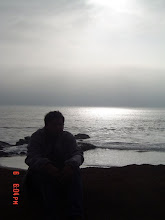This post is inspired by quite a few incidents in the author's life - notable amongst them being the recent trip to India, the visit to ISKCON temple, LA today, and R K Narayan's essay on a similar theme. One of my friends was of the opinion that India would get back most of its values from the West (a sign of the times). Another quote from Swami Vivekananda, about spirituality being for the rich, comes to my mind at this juncture.
India, has been endowed with a rich heritage of enigmatic spiritual outlooks, tolerant religious values, and scintillating musical systems. While, the Indian is definitely more interested with the daily issues of roti, kapda aur makan, the non-Indian looks at India as a place filled with mystics. They think India is all about caste system, yoga, transcendental meditation, carnatic music, hindustani music, esoteric dances, folklore, mythology, and the sacred cow. For us, Indians, it is all about economic development, technology transfer, infrastructure, 120 kmph highways, cell phones, literacy, etc.
Thus, the Indian is more interested in his Western counterpart, while the Westerner looks towards India seeking a deeper purpose. One day, the West would come to India for its values and India would go to the West for its own values.
Certain recent trends in India, US and elsewhere:
The increasing number of new-age spiritual organizational bases in the West, The Art of Living, ISKCON, etc. with more people getting interested into Yoga, Pranayama, Kriya, Bhagavad Gita, Bhagavat, Krishna, etc. One American lady had asked this profound question to the bemused author, while finding her way to the ISKCON temple, "Where is this place called Govinda?" I am sure that the realization of Govinda would be a sublime quest for many of us.
The author had attended Veena E Gayathri's recital in a temple at Mylapore, Madras during the December season. He found a few Americans seated in the front, greatly enjoying the performance. This is often a point of condescension amongst the Indian music connoisseur (a purist) who wonder, "What do they understand about our music?". But then, isn't music all about transcending all barriers and touching the soul? However, language does continue to be a problem for us and them when it comes to vocal music.
The American disciples of Ustad Ali Akbar Khan and Pandit Ravi Shankar, who have been under their tutelage for close to 30-35 years. Further, it must be noted, that they had made this shift post their formative years, after nearly 30 years of a life richly soaked in Western Classical and Jazz.
Most Indian Classical music concerts that the author has been to in the US, has had a fair representative audience of the Americans. The appeal of the drums (in their language) - the Tabla and the Mridangam and their intimate connection to the rhythmic patterns. When will we ever learn this magnificent tolerance?
The author was surprised to find a bus driver get a phone call as he was making a left turn in a busy intersection in Madras. He promptly answered the phone (after taking the turn) and informed the caller, that he is on so-and-so road, and on this trip. Auto drivers are very professional these days by giving visiting cards with cell numbers to their passengers.
On this similar theme of cell phones, a salesman in a home applicance shop in Madras was astonished and shocked to find the author without a cell phone connection. He veritably treated the author as an alien. He unfortunately happened to be a salesperson of washing machines and not cell phones. Thus, with this dichotomous state of existence, I am an alien both in the US and the India.
The golden quadrangle, esp. the highway from Madras to Bombay is great with cars like Maruti Swifts, presumably one of the best cars in the Indian market according to some so-called automobile experts, doing a 120-130 kmph. The only irritant proved to be the ignorant villager, who assumed the two-lane one-way highway to be a two-way and continued to live in that state of ignorance to the angst of the car drivers.
The American mind's obsession with elephant rides in India. I have often been asked, (well, to be exact, atleast once for sure), "Do people ride on elephants in India". I am sure they must be amazed to know that India is fast trying to catch up with the highly efficient and mundane road system of the West. (It is the same everywhere. Green boards, broad roads, same chain of stores everywhere.)
In most heritage sites in India, the Westerner is treated with more respect. He/she shells out more for the services rendered, be it the entry ticket, the guide, whatever. He/she is more likely to buy merchandise as memorabilia at one of the most bullish prices around.
The same preferential treatment can be seen in the Indian craft emporia. What would an average Indian do with a handicraft, priced 2000 INR (for the Indians) or at 100 USD (a special price for them), when the money could see him/her through a month's expenses in provisions?
All said and done, the quality of life in India is really high. If all goes well, give India a few decades to catch up to the West. India has issues to take care of. India shining has a long way to go. However, one fervently hopes, that all this is not at the cost of erosion of Indian values.

